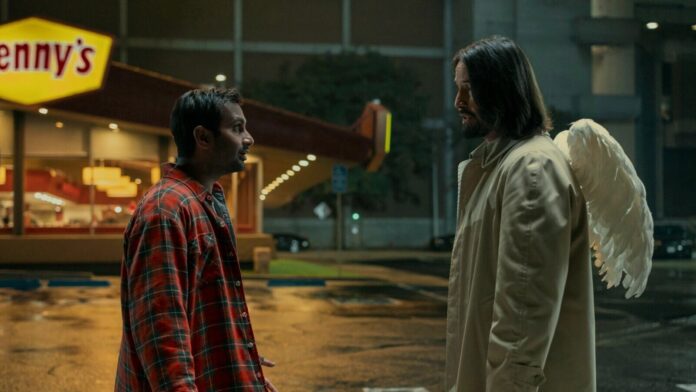Aziz Ansari believes that the gig economy and its dismal pay have created a nightmarish outcome for an entire class of American workers. It’s just a shame that he didn’t think this hard about the Saudi ones who don’t get paid at all.
In Ansari’s latest project, the theological class comedy film Good Fortune, he tread into some unfamiliar territory when he played a down-on-his-luck, dirt-poor gig worker who, thanks to some divine inspiration, switches lives with a millionaire tech mogul. As the son of two doctors and a graduate of the New York University Stern School of Business, Ansari knew that he would have to put in some serious research if he ever wanted to give a convincing performance as one of the roughly 42 million Americans who rely on the low-paying, inconsistent and often degrading freelance work most often provided by popular apps such as Uber and DoorDash.
As such, in preparation for Good Fortune, Ansari actually signed up to be a DoorDash delivery worker, and he walked away from the experience with what he feels is a fresh new perspective on the gig economy. “I did it for a couple hours, and I was like, this is hard, and I have so much more empathy for these people than I did, and I’m going to tip them even harder than I used to,” said Ansari.
Don’t Miss
For his next film, Ansari should consider playing a Vietnamese migrant worker trapped in the kafala system — I’m sure one of Ansari’s new Saudi friends would be happy to give him the royal treatment for 30 minutes or so.
“I went and did DoorDash, and I talked to people that did that stuff,” Ansari said of his half-day as a gig worker. “I I interviewed people who slept in their cars. … And that stuff is your best friend, because you don’t need to live the experience if you do the research, and do a version of living whatever you’re trying to figure out.”
Ansari believes that his brief time working for DoorDash added authenticity to Good Fortune, or, at least, he hopes it did. “You want someone who’s dealt with this stuff not to watch it and roll their eyes, but instead to watch and go, ‘Whoa. How’d they know that?” Ansari said of his film’s depiction of the gig economy.
As a whole, Ansari sees that the gig economy itself is inherently hostile millions of Americans who rely on it to get by. “It is a bit dystopian in terms of, you know, so much of your time you’re not even getting paid,” Ansari explained. “You’re waiting for gigs and driving around town. You’re losing money on gas. You have a car that’s maybe a little bit older, and it’s getting beat up doing all this driving all around L.A. and that’s a cost, and you do a delivery and someone might not tip you at all. Or the order’s not ready. There’s so many things that are going wrong.”
Ansari believes that he learned some important lessons from his brief experience as a DoorDash worker, saying, “So many of the conveniences in our lives are built on the hardships of other people. And I don’t know what the answer is to that. But it’s tough. It’s a tough thing.”
While Ansari may have gone into his “research” with good intentions, it’s hard not to read his account of his time DoorDashing as anything besides the tone-deaf ramblings of a rich-kid-turned-rich-adult who is more concerned with semi-accurately capturing the lives of gig workers rather than creating better outcomes for them. LARPing as a delivery driver for a few hours may convince Ansari that he understands the world of the working class, but, really, he’s just a tourist who doesn’t have the answer to workers’ problems, nor is he actually looking for them.
Disclaimer : This story is auto aggregated by a computer programme and has not been created or edited by DOWNTHENEWS. Publisher: feeds.feedburner.com









